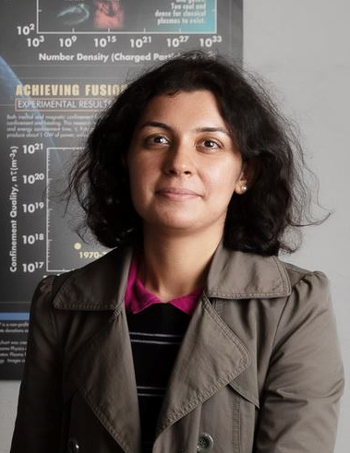
Associate Professor Arunima Malik of the University of Sydney has been named Australia's National Champion for the Frontiers Planet Prize for her paper published in Nature, Polarizing and equalizing trends in international trade and Sustainable Development Goals.
She is one of three researchers nominated by the Australian Academy of Science for the prize.
Awarded by the not-for-profit Frontiers Research Foundation, the Frontier Planet Prize is now in its third year. This prestigious prize recognises research with the most promising potential to keep humanity within planetary boundaries. Professor Malik's work will now advance to the international competition, with global winners to be announced at an awards ceremony in Villars, Switzerland on 17 June.
Chosen by a jury of 100 leading sustainability scientists, both national and international champions join the Frontiers Planet Prize alumni network, gaining opportunities to share their research and network at events in collaboration with the Frontiers Planet Prize partners.
Quantifying sustainability impacts
Associate Professor Malik's research leverages big-data modelling techniques to quantify sustainability impacts across multiple scales. She conducts supply-chain assessments to measure social, economic and environmental impacts, often using input-output analysis. Her work focuses on understanding how consumption in one country affects the environment and society of its trading partners, with the goal of informing national and trade policies to mitigate negative impacts and address climate-related issues.
"We live in an increasingly interconnected world driven by complex supply chain networks, where consumer demand in one region influences production in another," Associate Professor Malik said.
"These interconnections present opportunities to improve standards of living, skill development and employment generation, but also generate adverse impacts in the form of resource depletion, pollution, habitat loss and inequality.
"International trade can amplify these effects by placing pressure on vulnerable nations, leading to spillover effects that hinder countries' ability to progress toward the UN Sustainable Development Goals," she said.
First-ever global assessment
Associate Professor Malik and her co-authors from the University of Sydney, Charles Darwin University, Vienna University of Economics and Business and the United Nations Sustainable Development Goals Network undertook a first-ever global assessment to analyse trends in consumption-driven polarising and equalising effects of international trade.
"There is a growing disparity between nations that benefit from trade and those that bear significant environmental and social costs, deepening existing inequalities. Our research underscores the critical importance of considering consumption-based cross-border impacts within the framework of the UN Sustainable Development Goals," she said.
The two runner-up Australian nominees, Dr Emma Camp from University of Technology Sydney and Professor Chris Greening of Monash University, are also leaders in sustainability science.
Dr Camp is a coral biologist and marine biogeochemist who studies the role of marginal reef environments in understanding the impact of future climate change on coral reefs.
Professor Greening studies how microbes 'live on air' by consuming atmospheric hydrogen. His research focuses on the enzyme Huc, which allows bacteria to use hydrogen as an energy source.






